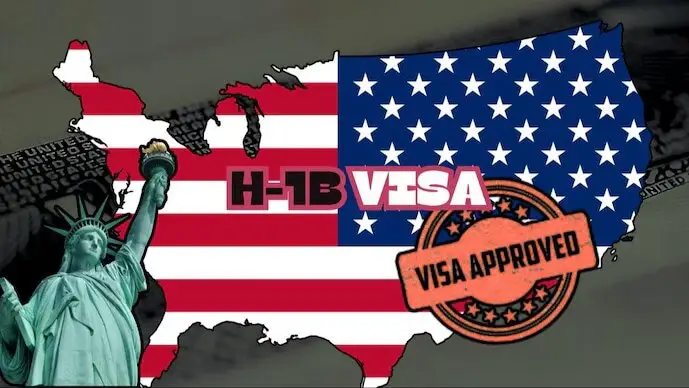There is relief news for millions of Indians who want to study and get a job in America. Because, the Department of Homeland Security (DHS) has announced a final rule to modernize the H-1B visa program, helping US companies more effectively fill critical job vacancies. This updated rule, effective January 17, 2025, will streamline the approval process, provide employers greater flexibility to retain top talent, and strengthen program integrity and oversight.
Indians are likely to benefit the most from this move.
In fact, Indians have acquired a large share of H-1B visas in recent years. The update will also benefit Indian students on F-1 visas in the US as the new rules attempt to help them get jobs.
According to the US Citizenship and Immigration Services (USCIS), the purpose of these changes is to fill vacant positions in important sectors and grow the US economy. “American businesses rely on the H-1B visa program to recruit highly skilled talent, benefiting communities across the country,” said Secretary of Homeland Security Alejandro N. Mayorkas.
“These improvements to the program provide employers greater flexibility to hire global talent, boosting our economic competitiveness and allowing highly skilled workers to drive American innovation,” he said.
Main updates in the New Testament
Key updates in the new rule include flexibility for F-1 visa students to transition to H-1B status, ensuring continued lawful status and employment.
The new rule allows expedited processing for individuals already approved for H-1B visas and extends eligibility to beneficiaries with a controlling interest in the petitioner organization under certain conditions.
Additionally, the new rule strengthens the integrity of the program by codifying USCIS’s authority to conduct inspections and impose penalties for noncompliance.
It requires employers to establish that they have a bona fide job in a particular occupation by the worker’s start date and provide supporting documentation consistent with their labor status application.
According to USCIS, H-1B visa petitioners must also have a legal presence in the US and be subject to US legal processes.
New rule modernizes definition of H-1B visa
The H-1B visa program, established by Congress in 1990, allows U.S. employers to temporarily hire foreign workers in specialized occupations that require highly specialized knowledge and at least a bachelor’s degree.
USCIS According to , the new rule will modernize the definition of specialty businesses and clarify eligibility criteria, particularly for non-profits and government research organizations that are exempt from the annual visa cap.
USCIS “The changes made in today’s final rule will ensure that U.S. employers can hire the highly skilled workers needed for growth and innovation while enhancing the integrity of the program,” said Ur M. Jadou, Director of the U.S. Department of Labor and Policy at the University of Chicago.
The annual limit for H-1B visa has been set at Rs 85,000. And for this fiscal year, USCIS has announced that they have reached the annual quota. Of these 85,000 H-1B visas, 65,000 are for the regular visa and the remaining 20,000 are for US advanced degree or master’s degree. But many nonprofits are exempt from that limit.
H-1B visa holders are mainly from India. In 2023, of the 386,000 H-1B visas issued, 72.3% were to Indians.
American companies rely on H-1B visas to hire hundreds of thousands of workers every year from countries like India and China.
H-1B visa applications often exceed the annual limit, and visas are awarded through a lottery system. This means that many qualified applicants are rejected simply due to chance.
However, cap-exempt organizations, such as some nonprofits and government research institutions, can apply for H-1B visas year-round without being limited by the annual cap.
Under the new rule, these organizations will be more clearly defined as those whose main activity is research. According to The Hill, this change is intended to clear up previous confusion over which organizations are eligible for cap exemptions.
